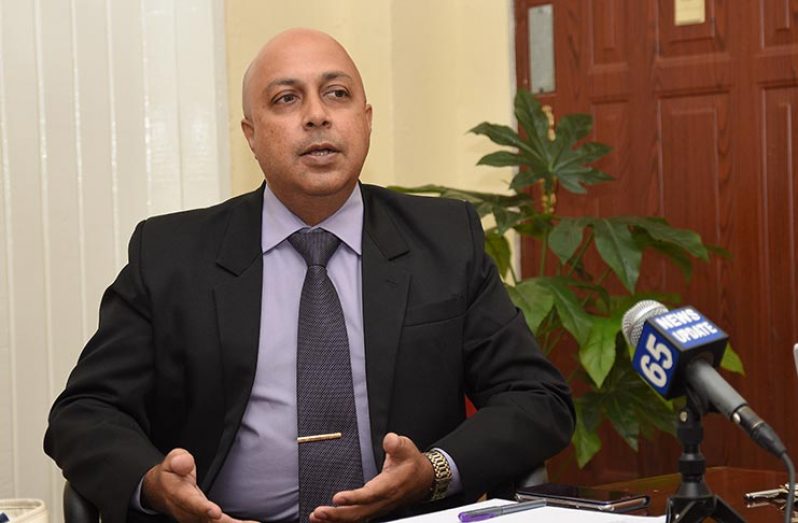GUYANA’s first Credit Bureau, CreditInfo, says that several credit agencies have been taking advantage of its vast credit database resulting in lenders such as commercial banks approving loans in one day rather than weeks or months.
The system being referenced utilises the credit reports of all borrowers from various types of credit entities in the country to provide information to lending agencies on the creditworthiness of an individual or business.
It significantly cuts down on time associated with the need for a list of documents for borrowers to prove their history or credit habits to potential lenders.
At a press conference on Monday at the agency’s local head office, Chief Executive Officer (CEO), Judy Semple-Joseph and Manager of Sales and Business Development, David Falconer, provided a detailed update in this regard.
Semple-Joseph said that while the concept of an agency providing information from institutions to commercial banks is a relatively new concept to Guyana, it [is] necessary as it presents benefits both to the corporate community and general public.
Some of CreditInfo’s subscribers, which number 26, include commercial banks; non-bank financial entities; micro-financing institutions; utility services; insurance companies; student loan agencies; credit unions and trade creditors.
Comprehensive data on all borrowers in Guyana is now being routinely and regularly updated to CreditInfo’s database for use in creating credit reports.
These actions meet the mandate of the Credit Reporting (Amendment) Act 2016 for regulated credit information providers to upload credit information to the licensed Credit Bureau.

Following the (Amendment) Act, the Bureau was strengthened and better able to maintain credit records in its database, therefore bringing Guyana in line with modern practices.
At the press conference, the CEO said that in this the beginning stage, commercial banks and credit unions, at the click of the mouse, can have access to credit checks on any potential borrower viewing their credit payment history, habits and debts to other lenders.
Meanwhile, the borrower, in turn, is able to request their personal credit report utilizing it as a means to be more aware of their chances for approval prior to approaching a lender and to monitor and control their credit situation.
“This works to the benefit of both parties as it encourages and guarantees responsible lending and responsible borrowing,” Semple-Joseph said.
Creditinfo also has high on the agenda matters of safeguarding privacy, confidentially and accuracy of information.
“This information is subjected to a series of checks and balances before it even hits our database. Because what we’re doing here is that we’re purporting to make judgements on your creditworthiness. That’s a very important thing; it’s serious business. So we won’t allow or take the chance on inaccurate data produced in any incorrect credit report which will then negatively affect your ability to obtain credit,” Falconer assured.
The two heads also stressed the need for more small businesses and individuals to take advantage of CreditInfo’s vast database by regularly checking their credit score.
The agency currently experiences an average of 40 direct consumers per month which request their credit report information while some 4,000 credit reports are accessed by subscribers per month through the system.
“It is not a number that we’re happy with because we want to see more persons being aware of what credit info has to offer but more importantly, the importance of them knowing what their credit profile looks like before approaching any lenders,” the CEO said, referring to individual checks.
She further explained that the process for acquiring one’s credit report is simple and almost instant as all that is required is the individual’s Taxpayer Identification Number (TIN), Identification Card and the filling out of a request form.
By law, every person is entitled to one free credit report in every 12-month period but apart from that, it costs $5,000 for a credit report every quarter for one year or unlimited credit reports monthly at $8,000 per annum.
Meanwhile, CreditInfo is also working on creating an application by January 2019 which will allow persons to access their credit score ranging from 250-900 on their mobile devices and from the comfort of their homes.
It was the Government, which in January 2016, effected the changes to the Credit Reporting (Amendment) Act and Falconer said that a big part of the agency’s progression in the market can be attributed to support received from Government.
“As an organization, we are more than satisfied by the level of support [from the Government]. We’ve partnered with the Ministry of Business on more than one occasion through the Small Business Bureau (SBB)…the Minister of Business is present at all our outreaches. We never have to twist his arm, he’s always there, always willing,” Falconer said.
CreditInfo was given the licence to operate Guyana’s first Credit Bureau on July 15, 2013, and this year celebrates its 5th year of existence locally.
Its reports and services are tailored to positively transform the lending and credit provision environment in Guyana through comprehensible and informed risk assessment, decision-making and strategy.



.jpg)









